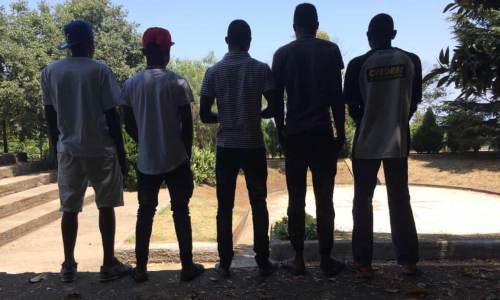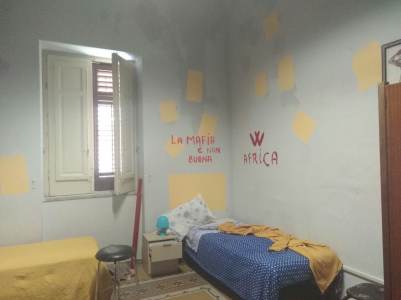The Everlasting Emergency: Centres for Extraordinary Reception (CAS)
As we have argued time and time again, the emergency management of
migration is not solely aggravated by the alarming state of reception in
governmental centres and sorting structures: we must add to this the issue of
informal centres, the so-called Centres for Extraordinary Reception (CAS),
whose number is growing, and whose reception more often than not is only
limited to food and accommodation.
CAS centres include a number of structures (hotels, B&B, private
housing, rentals), whose managers have signed a contract with the local
prefecture, by which he or she pledges to offer a reception service, against a daily
fee of 30-35€ per migrant.
CAS centres are only too often completely unprepared in terms of
reception, and we can track one of the causes for this situation back to the
very first rule within such an agreement, that is, that the sole essential
requirement is room availability. It matters very little that that the
individual who will take care of the reception itself has little to no
experience or particular inclination for this activity, and that the quality of
the reception will probably be tailored exclusively towards profit, and not
people (a profit which is higher the lower the costs per migrant are). After all, the priority of economic reasons
can be found anywhere within the first reception business!
This lack of preliminary conditions is followed by the lack of a control
system for such structures: even if geared only towards an emergency situation,
CAS centres are often those structures where asylum seekers spend the entire
period of their stay (until their hearing at the local commission), deprived of
fundamental services such as legal and socio-psychological support.
It is therefore interesting to analyse which are the juridical premises
of this type of reception, which is based on the agreements between private
managers and the Prefecture.
The most recently updated measure by the Ministry for Internal Affairs
is a letter dated 20 March 2014, whose subject was “Inflow of foreign citizens
following further disembarkations in Italian shores”, which is the key to
understanding the reality of CAS centres, and the nature of the agreements.
This letter illustrates a further emergency plan, in addition to the one
which had previously activated 115 structures, for a total of 5,500 places.
Because of the high number of arrivals, and because of the necessity to
“distribute said foreigners nationwide”, the letter demands that Prefectures
should find structures in their respective territories, for a total of 2,400
places. The deadline for the duration of said agreements is June 30 2014.
Playing by ear as per usual, in case the deadline is not extended, we
will witness for the second time to a
repetition of the end of the North African Emergency, when thousands of people
suddenly ended up on the streets.
Attached to the letter is a provisional scheme for the distribution plan
(to be modified only according to local necessities), which calls for 40 places
for each of the 59 Italian provinces, except for the Sicilian ones.
The agreements of reception centres expect:
- Administration management (control and verification
of the structure’s full functionality and efficiency)
- Generic assistance to persons (rules of
behaviour within the structure, laundry facilities, generic assistance to
persons)
- Environmental hygiene
- Provision of meals
- Supply of goods (bed and mattress sets,
products for personal hygiene, clothing, daily pocket money of €2.50, telephone
card of €15 upon admittance).
- Services for integration (information on
immigration norms and on the rights and duties of a foreign citizen, linguistic
and cultural support)
This list already shows how the control and verification of a
structure’s full functionality and efficiency are entrusted to the structure’s
own manager, and how legal support for asylum seekers is only blandly
guaranteed.
The agreements with CAS centres are only apparently structured in form:
in substance, they are completely insufficient at guaranteeing an adequate
reception, for they are lacking in a number of essential services (such as
legal assistance for asylum seekers), as well as they leave everything to
the manager’s discretion, since there is
no control system over services rendered.
Therefore in substance it happens that there is no guarantee for a
collaboration with local services or with cultural mediation specialists, nor
is there a guarantee for legal,
socio-psychological and health support: there are only operators who
provide meals and “guard” the structure.
Reading through the
agreements, there is a clear demand for the verification of a structure’s
adequacy by the Prefecture upon the start of reception activities, yet there
are no indications concerning who, when and how this verification ought to be
carried out.
A further provision allows the Prefecture the “faculty of calling for
verifications at any time by its own appointees, aimed at ascertaining the
correct fulfillment of services”. However, like for governmental centres, there
are de facto no systematic control
structures, nor have any resources been indicated to organise them. Therefore
control over said informal structures is left to the discretion of each
Prefecture, and it is often carried out (if it is carried out at all) only on
the basis of grave violations as reported by humanitarian organisations.
There are different questions and reflections which may arise out of
this “analysis”, yet the very first question is why, when there are 6,500
places available as accorded by the SPRAR (Protection System for
Asylum Seekers and Refugees), ought this kind of emergency reception be
financed, when it almost completely lacks any planning or professionalism, it
does not guarantee any respect for the rights of migrants, and it keeps on
feeding a frail and inadequate asylum system.
Giovanna Vaccaro
The Borderline
Sicilia Editorial Department
Translated by Angela
Paradiso




